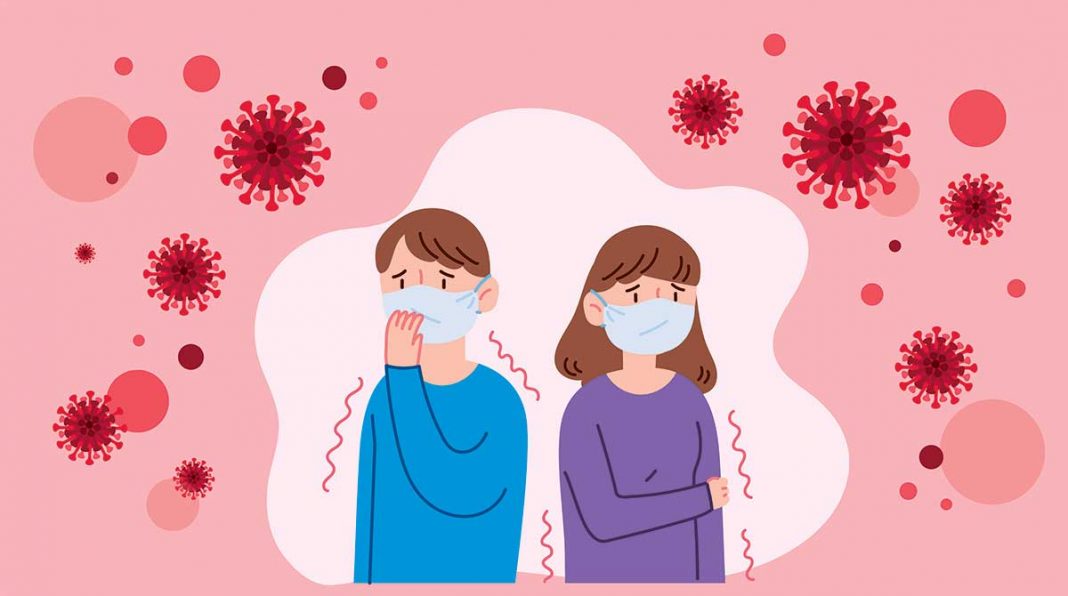First Island cases anticipated in April
LITTLE CURRENT – Island health professionals are taking a proactive approach to the possibility that the novel coronavirus COVID-19 could soon reach Manitoulin Island within a month and are canvasing clients as to their openness to being seen by their doctor through remote technology. The message coming out almost universally is that if you are suffering from symptoms that mirror those of the coronavirus, do not go to the emergency room if at all possible.
In the meantime, health organizations, emergency services and politicians are gathering to plot strategies for coping with the coronavirus when it makes its appearance in the North.
Northeast Town Mayor Al MacNevin, along with a host of literally hundreds of representatives spanning the political, law enforcement, EMS, District Services Boards (DSB) and long-term care facilities across the region attended a meeting called by Public Health Sudbury and Districts and hosted by the City of Greater Sudbury at its Azilda training centre to come up with plans to deal with the potential impact of COVID-19 on the region.
“There were a lot of folks from across the Island there,” said Mayor MacNevin. “Everything from hospitals, health teams, Noojmowin Teg, DSB, EMS and representatives of municipalities seem to have sent someone.”
Mayor MacNevin said that both the DSB and EMS “offered a lot of good ideas for helping out.”
One of the major concerns being expressed by health centre representatives and doctors generally is the potential for emergency rooms to be overwhelmed by an influx of cases.
“A challenge is that up until now, the 911 service has been telling people who have the symptoms to go to emerg,” said Mayor MacNevin.
A key concern for municipal officials is how to protect their own forces in the event of a pandemic. “If they are sending our firefighters to a residence to help people get down staircases and out of basements, how do we protect them?” asked Mayor MacNevin. “A struggle for me personally is that we, as municipal leaders, have been out of the loop on a lot of the health planning. What can work in places like Sudbury, where they have control over their nursing homes and EMS doesn’t necessarily fit somewhere like Manitoulin Island. I can’t go online and say ‘don’t worry, we have everything under control’ and step on the toes of the other municipalities and organizations. It isn’t one-size fits all.”
“There were some interesting ideas, like adopting a Korean model where people are self-isolated in their cars to be checked,” he said. Like a drive-in health checkup? “Yeah, something like that. There can be checkpoints where people are checked for symptoms in their vehicles. The EMS people were talking about units that they can take to people’s homes where they can be checked out remotely.”
Manitoulin has a distinct advantage in its two-site hospital as well in that one site can be designated for treating those with serious COVID-19 symptoms while the other maintains a regular emergency services.
“The challenge there is that we only have something like 19 beds available in our hospitals,” said Mayor MacNevin.
One of the areas where local municipal authorities can play an integral part in the response to a larger pandemic is the provision of alternate care sites, such as recreation centres and community halls. “That’s a place where we may be able to play a part,” he said.
“It might be a month until we see significant issues here,” suggested Dr. Stephen Cooper, a member of the Northeastern Manitoulin Family Health Team and chief of staff at the Manitoulin Health Centre. There is so much interaction between southern Ontario (where known cases had risen to 34 by press time Monday) and Manitoulin that it would be foolish to assume any sort of immunity, he added. “It is only rational to take some precautions.”
Dr. Cooper noted that health professionals are currently asking patients exhibiting symptoms if they have travelled to high risk areas, but they may soon move to assuming everyone exhibiting symptoms is potentially exposed and react accordingly.
Should the virus move into a serious pandemic situation locally, Island health professionals may soon find themselves working remotely in order to protect both their clients and themselves.
Although the number of cases in Ontario is still rising, provincial Health Minister Christine Elliott is not ready to put a ban on large-scale public gatherings.
“I think it’s really important that we respond to the situation that’s happening in Ontario and not move according to what other countries have been doing, because they have their own particular circumstances,” said Minister Elliott. “We do have a plan in place and we will escalate as and when we see the need to do so.”
Currently, the cases appearing in Ontario are still linked to recent travel or limited to those who have been in close contact with of those who were infected while travelling abroad. Ontario’s latest cases include a man in his 50s recently returned from Germany, a man in his 80s and a woman in her 70s who were both recently in Iran—all four of those patients have been released into self-isolation.
The Wikwemikong Health Centre (Naandwechige-Gamig) has responded to the coronavirus COVID-19 health situation by incorporating a temporary voice message (emphasis on temporary) that is “activated automatically when someone calls our main health centre phone line.”
That message is described as “a preventative measure aimed at reminding callers about the virus, symptoms and how to get medical or information assistance.”
An announcement from the Wikwemikong Health Centre goes on to note that the message is only about one minute in length and, once the message is complete, the call will continue on to a receptionist as normal. “So please, do not hang up if you are calling the health centre.”
The economic fallout from the “not yet a pandemic” has been severe and is being blamed for a massive stock market sell-off, a decline that marked the largest one-day point loss for the Dow on record and the largest single-session percentage hit since the recession of 2008. The Standard and Poor 500 plummeted more than seven percent, also the most since December 2008. The stock losses were led by stunning declines in the energy and financial sectors.
The associated drop in crude oil prices, in part sparked by a strategic price war launched by OPEC, will hammer the Canadian economy drastically and likely prove disastrous for the Alberta government which recently released a drastically slashed budget predicting oil prices would only fall to double where they had landed by Monday—a multi-billion dollar a day nightmare the embattled Alberta economy could well do without.
Closer to home, Ontario Finance Minister Rod Phillips is set to deliver Ontario’s latest budget on March 25. Minister Phillips said while COVID-19 is “clearly having economic impacts in Ontario,” it is too soon to predict exactly how it will impact the province’s finances.
“Economic forecasts that the budgets are based on are over a month old and we’re in a very dynamic environment,” said Minister Phillips. “One of the reasons that we’ve put in place the balanced, prudent plan we have is so that we could make adjustments if they were necessary.”
Manitoulin Island has an emergency preparedness plan in place, but that plan is geared more to catastrophic incidents such as airline crashes in the region and it has been many years since the plan was formulated. Municipal officials privately admit that it is probably time to revisit and overhaul the plan to reflect the realities presented by pandemics.
In other local reactions to the global virus crisis, Manitoulin Secondary School has cancelled a student trip to Europe this spring.
Despite a call by M’Chigeeng Ogimaa-kwe Linda Debassige to reconsider the massive annual Little NHL tournament scheduled to take place in southern Ontario during March Break, a sentiment whole-heartedly shared by Manitowaning’s Dr. Mike Bedard, organizers confirm that (although some Northern teams have chosen to pull out) the tournament will go on as planned.
Symptoms of the COVID-19 virus range from mild, much like the flu and other common respiratory infections, to severe and can include: fever, cough and difficulty breathing.
Complications from the 2019 novel coronavirus can also include serious conditions such as pneumonia or kidney failure, and in some cases, death. As of press time Monday, no deaths had been reported in Ontario, although Vancouver had reported a death in a long-term care home.
There are no specific treatments for coronaviruses and although teams are working towards it, there is no vaccine that protects against coronaviruses. That being said, the vast majority of people will recover on their own.
Advisories to protect against the virus will sound very familiar to those who have visited a health professional for help in dealing with a cold or flu. Health services advise that those suffering flu-like symptoms should drink plenty of fluids, get rest and sleep as much as possible, try a humidifier or a hot shower to help with a sore throat or cough and, if you need immediate medical attention, you should call 911 and mention your travel history and symptoms. Whatever you do, avoid the emergency room if you believe you may have COVID-19.
Coronaviruses are spread mainly from person to person through close contact, for example, in a household, workplace or health care centre. Everyday actions that can help prevent the spread of germs known to cause respiratory illnesses include washing your hands often with soap and water or alcohol-based hand sanitizer; only sneeze and cough into your sleeve; avoid touching your eyes, nose or mouth; avoid contact with people who are sick; stay home if you are sick.
Further, if you are travelling to an area known to have cases of coronavirus, be sure to avoid high-risk areas such as farms, live animal markets and areas where animals may be slaughtered contact with animals (alive or dead), including pigs, chickens, ducks and wild birds and surfaces with animal droppings or secretions on them.
M’Chigeeng had a community information session set for Tuesday, March 10 and Wiikwemkoong has an information session scheduled for 4 pm Thursday, March 12, upstairs at the Wikwemikong Arena.





